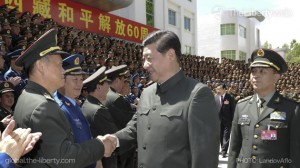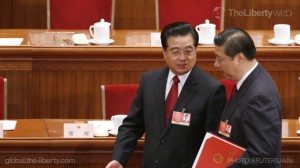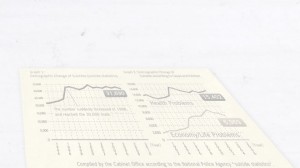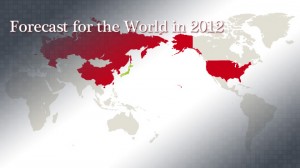Hold An Autonomous Nuclear Deterrence Capability!
~Times when the U.S. cannot guard Japan are coming~
The reason why the U.S. cannot guard Japan
Therefore, we need a discussion on “whether Japan should hold an autonomous nuclear deterrence capability” right now. For the Japanese politicians, the officials of the Ministry of Foreign Affairs and the Ministry of Defense, and the conservative international political scholars, having a disregard for the leftists, the only ground for their idea that Japan does not need the capability is, “The U.S. guards Japan from attack by other countries”. However, it is clear that the U.S. will no longer be able to guard Japan after fifteen to twenty years, considering the trend in the constant aggravation of the U.S.’s financial structure and the difference in the estimated future economic power and the scale of the military budgets between the U.S. and China.
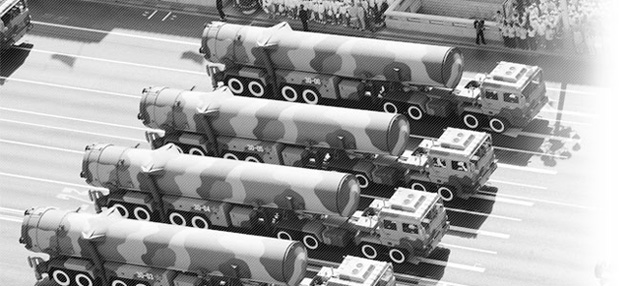
China's intercontinental ballistic missile, Dong-Feng-31A, which could prove a serious menace to Japan (EPA-Jiji Press Ltd.)
The U.S.’s economic power will continue to decline, while that of China will steadily increase. Even the IMF and the World Bank, which intentionally underestimate the scale of China’s economic growth for political reasons, estimate that China’s inflation-adjusted economic growth rate (not the nominal GDP, but the total amount of the actual fortunes and the services provided) will exceed that of the U.S. in 2016.
In addition, considering military power, I do not think that the U.S. will launch a full-scale offensive against China for Japan in case of emergency. China is armed with the intercontinental ballistic missiles (ICBMs), called Dong-Feng-31A and the submarine launched ballistic missiles (SLBMs), called Julang-2, both of which are mobile. There are tens of thousands of underground military bases throughout China, and the ICBMs are hidden there in the mountain areas. As the U.S. armed forces cannot destroy all of China’s nuclear war potential, neither by a pre-emptive attack, nor by a retaliatory attack, if the two countries plunge into a nuclear war, China’s nuclear missiles will fly at Washington, D.C. and New York City.
Joseph Nye, former Deputy to the Under Secretary of State and Richard Armitage, former United States Deputy Secretary of State said, “If the U.S. and China fire nuclear missiles at each other, the U.S. will defeat China in the end, as we have more missiles than they have. Japan does not need to worry about this”. However, such a discussion is a falsehood, because if even only one missile flies at a big city in the U.S., the U.S. President will never go to nuclear war against other countries.
The Treaty on the Nonproliferation of Nuclear Weapons (NPT) is also a stratagem to put Japan in an unfavorable position
The reason why Condoleezza Rice, former United States Secretary of State, as well as Nye and Armitage so often repeat such remarks, is to block Japan from holding an autonomous defense capability. As I explained during the interview in last month’s issue, the eternal forfeit of the capability has been the U.S.’s top priority policy toward Japan after the Second World War. Both the Democratic Party and the Republican Party agree with this point.
In the first place, the motive for the ratification of the NPT by the U.S. and the Soviet Union was to not allow Japan and West Germany to hold nuclear weapons. In early 1960s, Eisaku Sato, former prime minister, Japan and Konrad Adenauer, former Chancellor of West Germany began to speak out: “We want to hold nuclear weapons, too”. On listening to the comments, the Treaty was established in haste under the leadership of the U.S. to prevent the two countries from holding them.
In connection with this, Bernard Brodie, professor of University of California, Los Angeles, who is a celebrated military strategist said, “The NPT is a system which puts Japan in an unfavorable position forever on the international political scene”.
After that, the U.S. Department of State and the CIA forced Adenauer to resign by their fierce political maneuvering within West Germany. Sato was also kept down by them, and in the end, began to preach the necessity of the three nonnuclear principles. A person who said, “I want to hold nuclear weapons” at the start, did a complete change, and later became the winner of the Nobel Peace Prize as a reward.
The Soviet Union and the United Kingdom also endorsed the ratification of the NPT, but interestingly, Charles de Gaulle, former French President opposed it. He saw through the inner meaning of the Treaty and said, “The NPT is to strengthen the exclusive right to hold nuclear weapons for the U.S. and the Soviet Union, and as the result, it will put small nonnuclear powers in an unfavorable position forever. They will be made sport of by the nuclear powers”. China and India also sided with France. However, the U.S., the United Kingdom and the Soviet Union wanted to protect their vested interests and insisted: “We will establish the NPT system to maintain world peace”. That is typical international politics.

